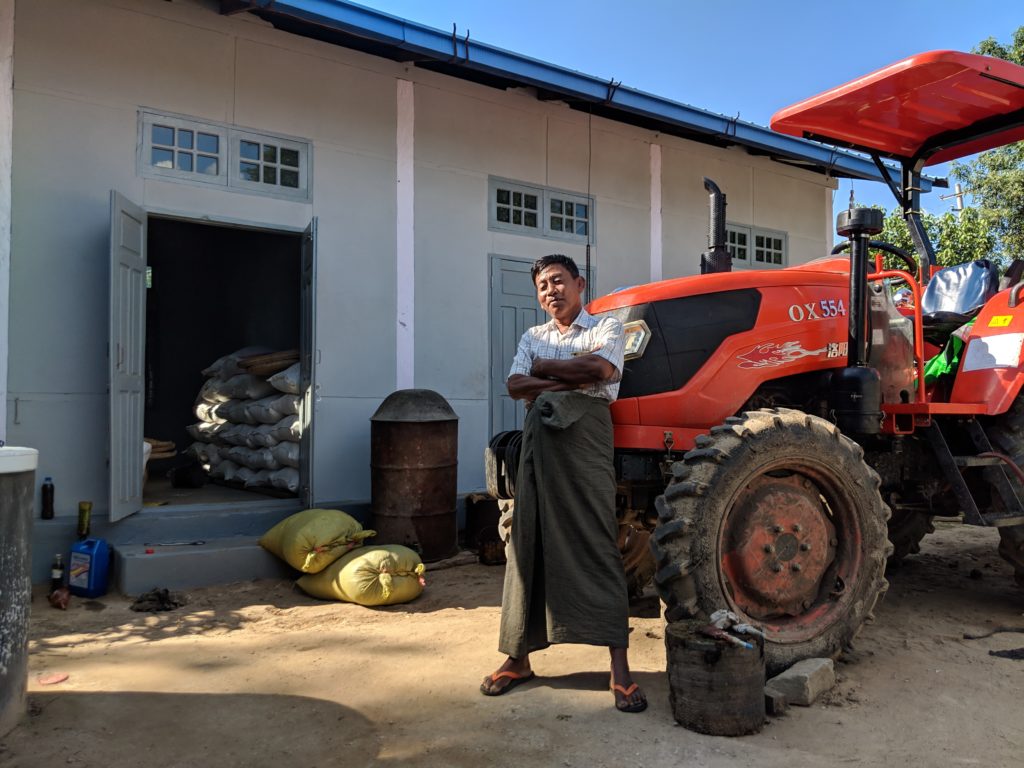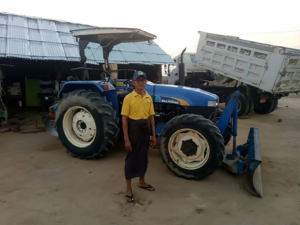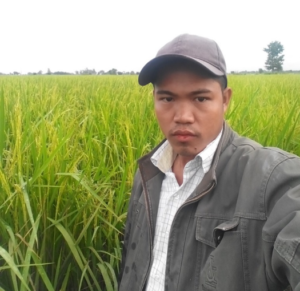
New Technologies Help Conserve Resources
Mya Maw Lwin has been a rice farmer for more than 20 years. He used primarily traditional practices on his farm. He broadcast his seed in the ground before transplanting. He used old seeds and never practiced row cropping. He only used urea fertilizer and had no knowledge of curing leaf blight or managing weeds. Once the rice was ready to harvest, he performed the traditional practice of gathering the rice and letting it sit in the field before moving it to a bamboo basket caked with cow dung and ashes.
Since his involvement with the Dry Zone project, he has revolutionized his rice farm. He uses a raised bed for his nursery before transplanting.
He only uses quality, high density grain and practices the floating saltwater test he learned in a farmer training. He plants three seedlings per hill and practices good water management. He also learned about balanced fertilizers and the 4R principles of applying them. He has learned to spot leaf blight and how to treat it before it infects too much of his crop.
The farmer said that before project intervention, he and others never practiced row cropping or any other GAPs. They only used urea. They generally yielded about 80 baskets per acre. Through project activities, they began to use balanced fertilizers, and their yields increased to 100 baskets per acre.
Mya Maw plans to continue applying IFDC technologies to his own field and spreading the word. He said most of the farmers in the area are now aware of the new technologies, and most of them reported using less seed while increasing yield. He said while many of the farmers in the area used to be hesitant to contact the DOA, now they feel comfortable and have a great connection with the field workers.
A Little Training Goes a Long Way
Smallholder farmers in Myanmar have always been under pressure to find sufficient farm labor at the right time and cost. Farmers also are strained by the high cost of agricultural inputs. One solution is the use of farm mechanization. Using mechanization can save farmers time and reduce input costs.
U Myint Soe is a farmer from Dar Hla village of Wundwin township. Recently, he purchased a new tractor to operate on his farmland and to rent to other farmers facing a shortage of animals and labor. He bought the tractor through an installment program funded by the LIFT Dry Zone Agro-Input and Farm Services project.
“There’s still not enough mechanization in my village or neighboring villages,” he said. “Hired hands and cattle for transport and land preparation are becoming scarce, and farmers have difficulty buying expensive tractors. But I bought a New Holland tractor available through the installment scheme, and I have been making payments with money earned from renting the tractor to other farmers.”
Since U Myint Soe was not familiar with farm equipment, he initially had trouble performing even routine maintenance of the tractor. Then he attended a training program for tractor operators organized by the Dry Zone project, John Deere, and New Holland Agriculture. The program included agronomy training to enable the tractor operators to provide advice to their farmer customers.
“I really felt I gained a lot of knowledge about the basics of my tractor, such as the engine, transmission, hydraulics, and power, through the tractor operator training,” U Myint Soe said. “I learned know how to perform tractor maintenance using safety precautions and how to protect myself against theft, property damage, and liability through the Farm National Insurance company. The training was very informative and useful for my farm work, and I put in practice what I learned as soon as I returned home.”
The following IFDC agronomy training program for tractor operators also changed his way of thinking about being a farmer. He always thought it was a handicap to be a farmer in Myanmar due to fluctuations in commodity prices, climate change, the high cost of agricultural inputs, and other unforeseen circumstances. After participating in a three-day agronomy training in Meiktila township, he realized that he can overcome these obstacles by using modern farming operations, such as off-season production to obtain a good market price, drip or sprinkler irrigation methods in rainfed areas, and the use of compost and crop residues to substitute expensive chemical fertilizers.
U Myint Soe had noticed soil degradation on his farm, but he did not realize that deep ploughing and continuous harrowing were factors that caused it. After the IFDC agronomy training, he understood that soil degradation was caused by continuous land preparation, and he was eager to share this knowledge with his clients.
Many of his farmer customers initially did not believe that deep ploughing leads to deterioration of their soil. They thought the tractor operators were promoting shallow ploughing to reduce fuel costs.
“Now I am informing customers about the importance of conservation agriculture and proper land preparation depending upon the nature of the crops they intend to grow. It is not an easy task for me. Being a farmer in my country is hard, and being a tractor operator is harder than anything.”
Engineer Made Farmer
Kyaw Zin Oo has a great interest in the farming business, although he earned a degree in Mechanical Engineering  from Magway Technological University. His parents were farmers in a village of Pwint Phyu township in Magway region. He began managing their farm after he graduated. His family has a 75-horsepower tractor purchased from John Deere. Being an engineer, he did not experience many problems with tractor maintenance or handling of farming implements. However, he lacked agricultural knowledge.
from Magway Technological University. His parents were farmers in a village of Pwint Phyu township in Magway region. He began managing their farm after he graduated. His family has a 75-horsepower tractor purchased from John Deere. Being an engineer, he did not experience many problems with tractor maintenance or handling of farming implements. However, he lacked agricultural knowledge.
Kyaw Zin Oo wanted to stop farming with traditional rice seeds that his parents had used. His dream was to start planting high-yielding varieties or hybrid rice seeds. The problem was lack of information and sources for obtaining good quality seeds.
He was able to fulfill his dream when he attended IFDC’s agronomy training for tractor operators in Magway township. After the training, he got a direct contact number for the Department of Agricultural Research (DAR) in Nay Pyi Taw. Now he is using new high-yielding varieties from DAR.
“I will be a pioneer in my village if my rice field is successful, and I want to fill the gap in providing good quality seeds to the community,” he said. “Farmers are now growing grains and getting low yields. Until the development of reliable seed industries, I have a strong desire to distribute the required seeds in my area to help these farmers. The knowledge and contacts I gained from the IFDC training program is helping me achieve this goal.”




